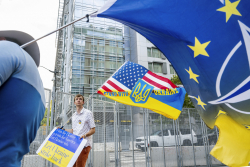First World War and its aftermath. Kennan argued that the war fundamentally changed the course of history, leading to the collapse of empires, the rise of new ideologies, and the reshaping of international relations. He believed that the war was a turning point in world history, marking the end of the old order and the beginning of a new era of uncertainty and conflict.
Kennan traced the origins of the First World War to a complex web of political, social, and economic factors that had been building for decades. He argued that the war was not simply the result of a single event or decision, but rather the culmination of a long process of escalating tensions between the great powers of Europe. He highlighted the role of nationalism, militarism, and imperialism in driving the continent towards war, as well as the failure of diplomacy and the lack of effective mechanisms for resolving disputes peacefully.
In his analysis of the war itself, Kennan focused on the human cost of the conflict and the devastating impact it had on societies across Europe. He described the horrors of trench warfare, the staggering casualties, and the profound psychological trauma that the war inflicted on soldiers and civilians alike. Kennan also explored the political and social consequences of the war, including the collapse of monarchies, the rise of totalitarian regimes, and the spread of revolutionary movements.
Kennan concluded his study by examining the aftermath of the war and its long-term consequences for international relations. He argued that the Treaty of Versailles, which imposed harsh terms on Germany and its allies, sowed the seeds of future conflict by creating a sense of injustice and resentment among defeated nations. He also warned of the dangers of isolationism and the failure of the great powers to address the underlying causes of the war, which ultimately paved the way for the Second World War. Overall, Kennan’s analysis of the First World War paints a bleak picture of a world torn apart by violence, suffering, and the failure of diplomacy, but also offers important insights into the complex forces that shaped the 20th century.









